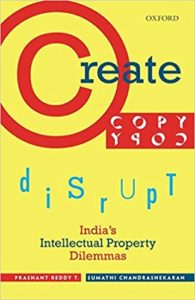“Create, Copyright and Disrupt”
23 April is celebrated as World Book and Copyright Day. According to UNESCO “23 April is a symbolic date for world literature. It is on this date in 1616 that Cervantes, Shakespeare and Inca Garcilaso de la Vega all died. It is also the date of birth or death of other prominent authors, such as Maurice Druon, Haldor K.Laxness, Vladimir Nabokov, Josep Pla and Manuel Mejía Vallejo. It was a natural choice for UNESCO’s General Conference, held in Paris in 1995, to pay a world-wide tribute to books and authors on this date, encouraging everyone, and in particular young people, to discover the pleasure of reading and gain a renewed respect for the irreplaceable contributions of those, who have furthered the social and cultural progress of humanity.”
 It is befitting to mention Create, Copyright and Disrupt: India’s Intellectual Property Dilemmas by Prashant Reddy T. and Sumathi Chandrashekharan. The title itself a play on the slogan “Create, Protect, Innovate” that has been adopted by IP agencies and IP conferences worldwide. It gives a good overview on the patent history in India particularly for the pharmaceutical industry, the impact of the Berne Convention the publishing industry in India to the recent amendment to the Copyright Act ( 2012) brought about at the insistence of ex-Parliamentarian and prominent lyricist Javed Akhtar and finally the Geographical Indications of Goods Act [Registeration and Protection] Act, 1999 illustrated with the famous Neem and Basmati rice cases. The essays are written lucidly with a view to being accessed by the lay person and not necessarily mired in legal speak.
It is befitting to mention Create, Copyright and Disrupt: India’s Intellectual Property Dilemmas by Prashant Reddy T. and Sumathi Chandrashekharan. The title itself a play on the slogan “Create, Protect, Innovate” that has been adopted by IP agencies and IP conferences worldwide. It gives a good overview on the patent history in India particularly for the pharmaceutical industry, the impact of the Berne Convention the publishing industry in India to the recent amendment to the Copyright Act ( 2012) brought about at the insistence of ex-Parliamentarian and prominent lyricist Javed Akhtar and finally the Geographical Indications of Goods Act [Registeration and Protection] Act, 1999 illustrated with the famous Neem and Basmati rice cases. The essays are written lucidly with a view to being accessed by the lay person and not necessarily mired in legal speak.
This is a good manual to have handy to understand how IPR works particularly since it revolves around the discussion and recognition of copyright as being a right to reproduce the work, communicate the work to the public or to the right to incorporate the work in another format such as a sound recording. This is dependant on recognising the author’s intellectual capital and compensating them adequately for it through licensing fees, time period of which varies from nation to nation. There are variations to this in the issue of first ownership of the copyrights particularly in the case of music and lyrics where the creator has been in the employment of the firm and been compensated for the work done. IPR conversations are critical since they link the creativity of a human mind to that of a right, the protection of whose onus falls upon the State, thereby ensuring the author/creator can earn some money of it. And it gains more significance when so much information is available digitally and where content is viewed as the oil of twenty-first century!
Prashant Reddy T. and Sumathi Chandrashekharan Create, Copyright and Disrupt: India’s Intellectual Property Dilemmas ( Foreword by Shamnad Basheer) Oxford University Press, New Delhi, 2017. Hb. pp. 372 Rs. 850
23 April 2017
